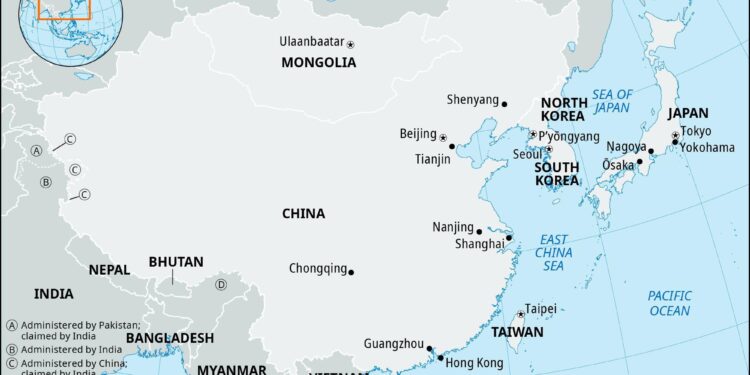East Asian Allies’ Absence at NATO Summit: Unpacking the Geopolitical Repercussions
In a notable diplomatic development, several prominent U.S. allies in East Asia, including Japan and South Korea, opted not to participate in the latest NATO summit. This decision has sparked considerable debate regarding the future cohesion of international security alliances amid escalating global tensions. As NATO convened to confront challenges such as Russia’s ongoing conflict in Ukraine and China’s growing assertiveness across the Indo-Pacific region, these absences highlight shifting priorities within key partnerships. This article explores the underlying reasons for this move, analyzes its impact on U.S.-led alliances in East Asia, and considers how evolving geopolitical realities are reshaping strategic alignments.
Reevaluating Security Alliances: The Significance of East Asian Non-Participation
The choice by Japan and South Korea to skip a summit traditionally dominated by Western defense cooperation signals more than mere scheduling conflicts; it reflects deeper strategic recalibrations. Historically aligned with NATO through shared democratic values and mutual security interests under U.S. leadership, these nations now face complex regional pressures that demand tailored responses beyond transatlantic frameworks.
Unlike Europe’s primary focus on countering Russian aggression—exemplified by recent sanctions and military support—the Indo-Pacific region grapples with distinct challenges such as China’s rapid military modernization and territorial claims over contested waters near Taiwan and the South China Sea. Additionally, North Korea’s persistent missile tests continue to pose immediate threats that require urgent attention from Seoul.
- Regional Threat Prioritization: Emphasis on localized security concerns over broader alliance commitments.
- Pursuit of Strategic Independence: Greater emphasis on autonomous defense capabilities alongside selective multilateralism.
- Navigating Sino-American Rivalry: Balancing economic interdependence with cautious deterrence strategies against Chinese expansionism.
- Evolving Economic Diplomacy: Maintaining robust trade ties while managing geopolitical risks within supply chains.
Divergent Security Perspectives: How Regional Realities Shape Alliance Dynamics
The absence from NATO discussions underscores a fundamental divergence between European-centric security concerns and those dominating East Asia’s agenda. While Europe remains preoccupied with Russia’s invasion of Ukraine—a conflict that has galvanized collective defense efforts—East Asian countries prioritize safeguarding sovereignty amid China’s assertive maneuvers around Taiwan Strait tensions escalating throughout early 2024.[1]
This divergence is further complicated by domestic political shifts within the United States itself; fluctuating policy stances have occasionally sown uncertainty among allies about Washington’s long-term commitment to regional stability.[2]
| Country | Main Security Challenge (2024) | Tactical Response |
|---|---|---|
| Japan | Tensions over disputed islands in East China Sea intensified after increased PLA naval patrols | Diversifying Self-Defense Force capabilities; expanding trilateral drills with Australia & U.S.; investing heavily in missile defense technology |
| >South Korea< | >Escalation of North Korean ballistic missile launches following recent nuclear tests< | >Upgrading THAAD systems; deepening intelligence sharing agreements with Washington; enhancing cyber-defense infrastructure< |
(Sources: Defense Ministry Reports Q1-Q2/2024)
A Path Forward: Strategies for Reinforcing Ties With East Asian Partners
The evolving landscape necessitates a nuanced approach from Washington aimed at revitalizing trust while accommodating regional imperatives unique to Asia-Pacific partners. To foster stronger collaboration moving forward, several measures should be prioritized:
- Sustained High-Level Engagements: Institutionalize regular summits involving senior officials from both sides focused explicitly on Indo-Pacific security issues rather than broad transatlantic agendas alone.
- Create Specialized Working Groups: Develop joint task forces targeting emerging threats like cyber warfare or supply chain vulnerabilities specific to this region.
- Cultural Diplomacy Initiatives: Expand exchange programs promoting people-to-people connections which build long-term goodwill beyond governmental relations.
- Economic Integration Efforts: Pursue comprehensive trade deals reducing barriers while encouraging innovation partnerships especially around green technologies & AI sectors.
- Bilateral & Multilateral Defense Cooperation: Sustain investment into joint exercises tailored toward rapid response capabilities addressing localized contingencies without diluting broader alliance commitments.
Initiative Name Description & Expected Impact (2024–25) Bilateral Trade Agreements Enhancement
(e.g., US-Japan Digital Economy Partnership)Aims at lowering tariffs for tech goods/services fostering competitive markets benefiting all parties involved amidst global supply chain realignments post-pandemic disruptions. Sino-Indo-Pacific Technology Collaborations
(Joint R&D projects focusing renewable energy solutions)This initiative encourages pooling resources towards sustainable innovations critical given climate change urgency affecting vulnerable island states nearby. “Quad Plus” Security Dialogues Expansion
(Including ASEAN members alongside core Quad countries)An effort designed to broaden cooperative frameworks addressing maritime security challenges collectively rather than fragmented bilateral approaches. A Final Reflection: Navigating Complex Alliances Amid Shifting Global Power Structures
The deliberate nonattendance of key East Asian allies at this year’s NATO summit encapsulates an intricate balancing act shaped by competing priorities between local exigencies and global partnership expectations. As Beijing continues its assertive policies throughout early-mid-2024—including increased incursions near Taiwan airspace—and Pyongyang advances its nuclear arsenal,[3] nations like Japan, South Korea, and Australia are compelled toward pragmatic strategies emphasizing self-reliance complemented by selective multilateralism rather than wholesale alignment under traditional Western-led institutions alone.
This moment presents an opportunity for Washington not only to reaffirm its commitment but also adapt engagement models recognizing diverse threat perceptions across regions—ensuring alliances remain resilient against emerging challenges well into this decade.[4]
